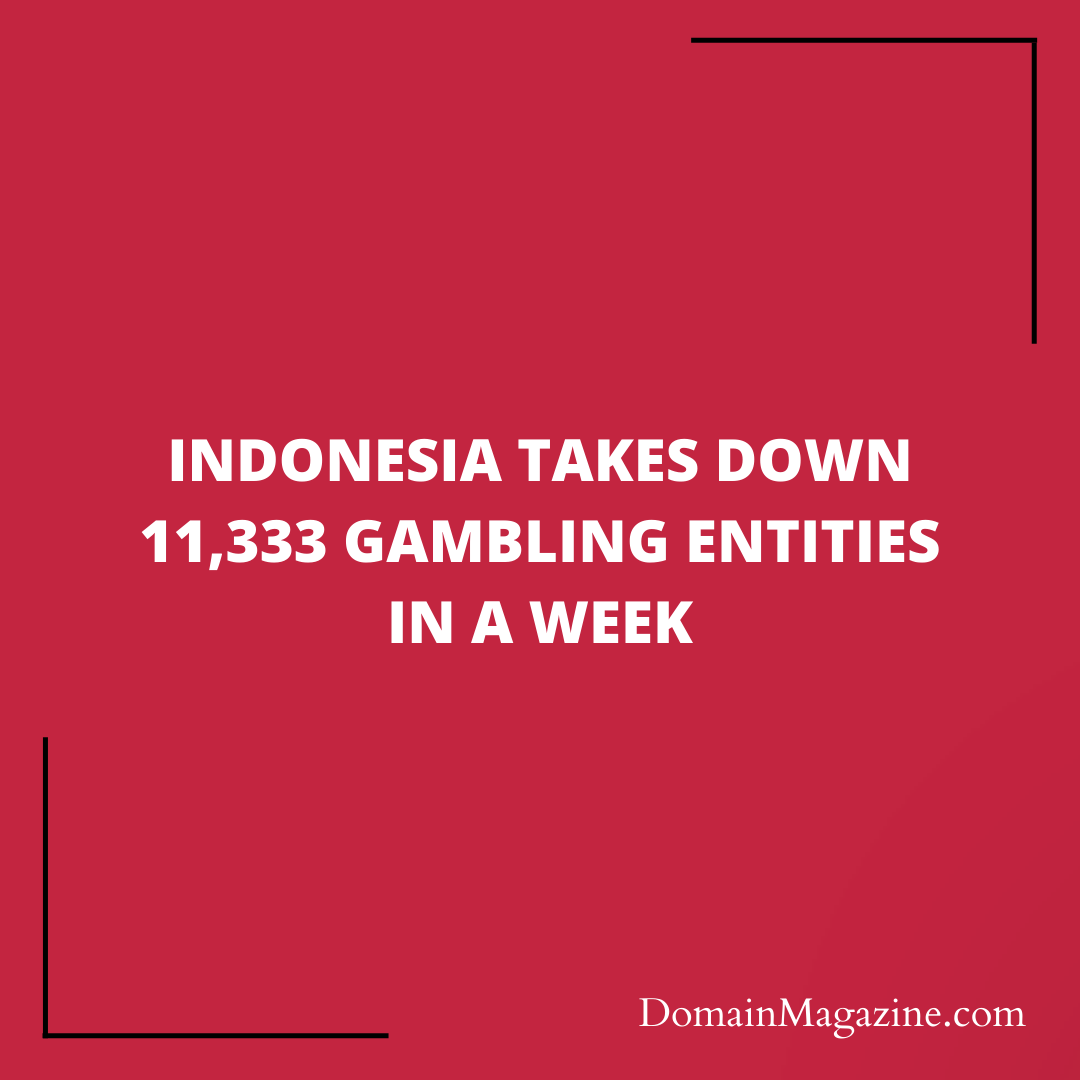In a resolute stand against online gambling, Indonesia’s Communication and Informatics Ministry has taken down 11,333 gambling entities within a single week (July 13-19, 2023). The ministry’s relentless efforts to combat illegal online gambling reflect the country’s staunch stance against this activity. This article explores the reasons behind Indonesia’s strong opposition to gambling, compares its approach to other countries, and discusses the potential future of online gambling regulations and control in the country.
Indonesia’s Stance Against Gambling:

Indonesia has a long-standing history of disapproving of gambling, driven by cultural, religious, and moral factors. The majority of Indonesia’s population practices Islam, a religion that strictly prohibits gambling as it is considered sinful and against religious teachings. Consequently, gambling is largely illegal in the country, with only limited exceptions in certain regions. The Indonesian government aims to protect its citizens from the potential social and financial harm associated with gambling activities.
The Crackdown on Online Gambling:
Between 2018 and July 19, 2023, the ministry has successfully taken down an astounding 846,047 instances of online gambling content. In the span of just one week, from July 13 to July 19, 2023, an impressive 11,333 online gambling entities were blocked from accessing the Indonesian public. These numbers highlight the magnitude of the issue and the ministry’s proactive approach to tackling illegal gambling head-on.
The crack down is primarily fueled by two factors: cyber patrols conducted by the ministry and complaints received from the general public, agencies, ministries, or institutions. This illustrates the government’s commitment to engaging citizens actively in the effort to create a safer online environment. The involvement of multiple stakeholders empowers the authorities to swiftly identify and take down gambling-related content that might otherwise have gone unnoticed.

Moreover, the ministry has leveraged its cekrekening.id platform to receive and process complaints related to banking account abuse linked to gambling activities. The platform has received a total of 1,914 complaints in 2023, out of which a staggering 1,859 complaints were specifically related to the use of banking accounts for online gambling. This data reflects the financial dimension of the issue, demonstrating the potential harm caused to individuals and financial institutions by illicit online gambling activities.
Enforcement of anti-gambling laws in the digital age poses unique challenges, particularly when gambling entities utilize social media platforms to disseminate their content. However, the Indonesian government is resolute in its approach and can request the removal of gambling content found on social media platforms. Non-compliance from such platforms would result in sanctions as per the prevailing laws and regulations.
Comparison with Other Countries:
While Indonesia maintains a stringent stance against gambling, several other countries have taken contrasting approaches to online gambling, leading to varied regulatory frameworks and outcomes.
European Countries and the United Kingdom:
In many European countries and the United Kingdom, online gambling has been legalized and regulated. Governments have established licensing systems to allow operators to offer gambling services legally under strict regulatory guidelines. This approach has helped generate substantial tax revenues for these nations, contributing to their economies. Moreover, robust regulations ensure that operators adhere to responsible gambling practices, protecting consumers and preventing potential addiction issues. The existence of well-regulated online gambling platforms provides a safer alternative for those who wish to engage in gambling activities.
United States:

In the United States, the regulation of online gambling varies from state to state. While some states have legalized and regulated online gambling activities, others have imposed strict bans. The legal landscape has evolved over the years, and the U.S. Supreme Court’s decision to overturn the Professional and Amateur Sports Protection Act (PASPA) in 2018 opened the doors for states to legalize sports betting. As a result, many states have embraced this opportunity, while others continue to debate the potential risks and benefits of online gambling.
Australia:
Australia has adopted a mixed approach to online gambling, allowing certain forms of it to be offered legally while strictly prohibiting others. Online sports betting and lottery products are permitted under regulated conditions. However, the Interactive Gambling Act of 2001 prohibits online casino-style games and poker, aiming to protect citizens from the perceived risks associated with these activities. The Australian government is also actively working to combat illegal offshore gambling operators targeting its citizens.
Asian Countries:
Like Indonesia, many Asian countries also have strong anti-gambling sentiments. In some nations, such as Singapore, gambling is strictly regulated and limited to specific government-sanctioned entities. However, other countries, such as the Philippines, have taken a more permissive approach, allowing certain forms of online gambling through licensed operators. The diversity of approaches within Asia reflects the varied cultural, religious, and economic factors influencing gambling policies.
The Future of Online Gambling in Indonesia:

Indonesia’s uncompromising approach to online gambling is likely to persist in the foreseeable future. The government’s dedication to protecting its citizens from the potential social and financial harm associated with gambling aligns with its cultural and religious values. As technology continues to advance, the Communication and Informatics Ministry will face new challenges in combating illegal online gambling effectively.
With increasing digitalization, the ministry may explore more sophisticated methods of monitoring and enforcement to stay ahead of evolving online gambling tactics. Collaboration with cybersecurity agencies, as demonstrated by their partnership with the National Cyber and Crypto Agency (BSSN) and the Indonesian Internet Domain Name Registry (PANDI), will remain crucial in this endeavor. Furthermore, the ministry might consider studying successful regulatory models implemented by other countries to draw valuable insights for potential future adjustments to their own approach.
While other countries may find ways to balance the benefits and challenges of online gambling through regulation, Indonesia’s firm stance against gambling is unlikely to waver. It will continue to prioritize the preservation of cultural and religious values while striving to create a safer digital environment for its citizens. As the digital landscape evolves, Indonesia’s commitment to curbing illegal online gambling will serve as a cornerstone in ensuring the well-being of its people and upholding its core principles.
Conclusion:
Indonesia’s Communication and Informatics Ministry’s crackdown on 11,333 gambling entities within a single week underscores the nation’s unwavering commitment to combat online gambling. Rooted in cultural and religious values, Indonesia’s opposition to gambling remains steadfast, and the country continues to prioritize the well-being of its citizens by taking robust measures against illegal gambling activities. While some countries have embraced online gambling under strict regulations, Indonesia shows no signs of deviating from its stringent policies. The future of online gambling in the country will largely depend on its ability to adapt to technological advancements and maintain an effective collaborative approach to curb illegal activities effectively.


Join the Discussion